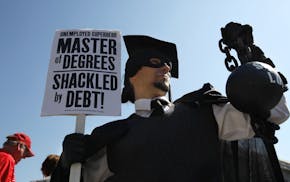Enron's bankruptcy 10 years ago Friday taught investors to trust no one. Not senior executives, not the analysts, not the accountants, and definitely not the regulators or Wall Street bankers.
It was a lesson we proved all too willing to forget. Within a few years millions of Americans would lose everything on another sure-fire, can't-miss investment -- their homes. And the people who helped make that possible were some of the very same institutions that looked the other way when Enron, WorldCom, Global Crossing, Tyco, Adelphia Communications, Fannie Mae, Freddie Mac and a host of other big companies were found to be cooking their books.
Exhibit No. 1 is last week's proposed settlement between federal regulators and Citigroup over its role in assembling and marketing a pool of subprime mortgages. The New York bank stood accused of rigging the investment to fail, and then placing side bets on it doing just that. Regulators say investors lost $700 million, while Citigroup earned $160 million.
This was supposed to be one of those wash/rinse/repeat settlements that Wall Street is famous for. Regulators file lengthy list of charges. Company neither admits nor denies guilt, pays a fine and promises to be good.
Company sins again.
This time, though, U.S. District Judge Jed Rakoff departed from the script. He called the $285 million settlement inadequate, specifically citing Citigroup's status as a repeat offender.
He should know. Citigroup paid out more than $3 billion in fines and legal settlements for its role in financing Enron. The bank paid out another $2.7 billion for its role in selling stock and bonds in WorldCom. The judge who agreed to some of those payouts? Rakoff.
Enron's implosion was a defining moment in American capitalism. Tech stocks had collapsed a year earlier, and investors had fled to the safety and security of big, fast-growing companies like Enron, where the notion of a New Economy still seemed to have some life. For six years Fortune magazine had proclaimed Enron the most innovative company in America.
The revelation that the Houston company's success was an accounting myth helped drive the Dow into bear-market territory. Congress responded with rare, bipartisan support for sweeping legislation designed to reform corporate governance and restore investor confidence.
The Sarbanes-Oxley Act was one of the best things to come out of the Enron scandal. It upped the level of required financial disclosure, set new rules to ensure the independence of analysts, auditors and directors, and it required boards to be more diligent in the exercise their oversight obligations.
"Directors ask more questions of management and are more cautious," said Stephen Quinlivan, a Minneapolis attorney who specializes in corporate governance and securities law.
Sarbanes-Oxley's critics say complying with its provisions is costly and time-consuming, though most studies have found those concerns to be overblown. There have been fewer initial stock offerings since Sarbanes-Oxley passed, but there are other factors at play there as well. For instance, Wall Street analysts tend to focus their coverage on bigger firms that are widely held.
Of course, Sarbanes-Oxley and lengthy jail sentences for Enron's top executives don't seem to have had a chilling effect on all bad behavior. Nor did Enron's collapse usher in a new era of transparency, investor skepticism and tougher regulatory oversight.
Even as Enron was going under and people were asking, "How could this happen?" clients were flocking to invest with the likes of Tom Petters and Bernie Madoff.
See-no-evil regulators, meanwhile, allowed the financial sector to cook up and peddle a toxic stew of mortgages, derivatives and off-balance sheet transactions that would eventually pull the economy into recession.
And we went along with it until it was too late, believing that this time things were different.
ericw@startribune.com • 612-673-1736

Wieffering: Time to get over debit card fees
For Thrivent and others, warnings were there

With billions in sales, some co-ops are big business
